 Paris Bibliothèque nationale de France lat. 6823, fol. 2r
Paris Bibliothèque nationale de France lat. 6823, fol. 2r
This website is the public face of a research project devoted to editing and translating Bartholomaeus's medical writings from the medieval manuscripts. The principal investigator is Prof. Faith Wallis of the Department of History and Classical Studies/Dept. of Social Studies of Medicine at McGill University in Montreal. The project is supported by an Insight Grant from the Social Sciences and Humanities Research Council of Canada.
Bartholomaeus of Salerno (fl. ca. 1150-1170) was one of the most influential medical figures of twelfth-century Europe. His medieval readers called him "an extraordinary and unique teacher" (precipuus ac singularis magister), and "the supreme theoretician of the art of medicine" (summus theoricus in arte phisice). His students, and their students, constituted the first generation of the new academic elite in the medical schools of Salerno, Montpellier and Paris. Bartholomaeus was the earliest named author to compose commentaries on all the components of the Ars medicinae or Articella, an anthology of texts by Hippocrates and others assembled around 1100 for the purpose of teaching medicine in an academic setting. In these commentaries, Bartholomaeus re-fashioned medicine as a systematic body of scientific theory based on principles of natural philosophy (he was precocious in his use of the new translations of Aristotle's scientific works), and as a practice grounded in this theory. The commentaries cover every domain of medical thinking, from anatomy and physiology to diagnostics, prognosis, and semeiology. Secondly, Bartholomaeus composed a widely-disseminated handbook of therapeutics or Practica, as well as letters of medical advice, and probably more.
Bartholomaeus of Salerno (fl. ca. 1150-1170) was one of the most influential medical figures of twelfth-century Europe. His medieval readers called him "an extraordinary and unique teacher" (precipuus ac singularis magister), and "the supreme theoretician of the art of medicine" (summus theoricus in arte phisice). His students, and their students, constituted the first generation of the new academic elite in the medical schools of Salerno, Montpellier and Paris. Bartholomaeus was the earliest named author to compose commentaries on all the components of the Ars medicinae or Articella, an anthology of texts by Hippocrates and others assembled around 1100 for the purpose of teaching medicine in an academic setting. In these commentaries, Bartholomaeus re-fashioned medicine as a systematic body of scientific theory based on principles of natural philosophy (he was precocious in his use of the new translations of Aristotle's scientific works), and as a practice grounded in this theory. The commentaries cover every domain of medical thinking, from anatomy and physiology to diagnostics, prognosis, and semeiology. Secondly, Bartholomaeus composed a widely-disseminated handbook of therapeutics or Practica, as well as letters of medical advice, and probably more.
|
McGill University
Department of History and Classical Studies 855 Sherbrooke West Montreal, Quebec H3A 2T7 Canada |